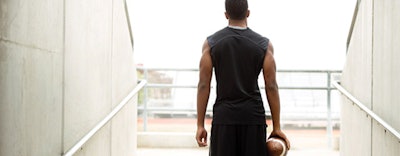
College athletics has never been bigger business, and the resulting pressure on student-athletes to perform at a high level can take its toll.
A troubling study of collegiate athletes found that a full 24 percent met the criteria of "clinically significant" depression. As we learn more about the mind-body connection and the ways in which participating in high-level sports can weigh on student-athletes, it's becoming increasingly important to consider student-athletes' mental health.
Consider the tragic case of Tyler Hilinski, the Washington State quarterback who took his own life in January.
It's important to note that, even as details surrounding Hilinski's death continue to emerge, officials — including WSU head coach Mike Leach — said that Hilinski exhibited no obvious signs of any serious personal or mental health issues. However, the case illustrates the stakes for a suffering student-athlete.

What can college and university athletics programs do to ensure their student-athletes are getting access to effective mental health management tools?
A student-athlete-led initiative at Oregon State offers one possible answer. The initiative, #DamWorthIt, is a creation of men's soccer player Nathan Braaten and former OSU gymnast Taylor Ricci, both of whom told USA Today that they lost teammates to suicide.
"Our goal is to destigmatize and spread awareness about the epidemic of mental health in collegiate athletics," Ricci said in a release.
The group is still in its early days but has begun its campus activity by setting up booths to distribute pamphlets and resources at events such as men's and women's basketball games, wrestling matches and gymnastics meets. In the future, they hope to host seminars, guest speakers and training sessions for suicide prevention.
Destigmatizing the conversation around mental health is undoubtedly an important part of the equation. After all, as Braaten put it to USA Today: "If you roll your ankle, you don't hide that injury from your team, right? We need to attack the stigma that [depression] is something you have to hide." But there might be ways to keep student-athletes from getting to the point of being depressed in the first place.
Last year, a study published in The Journal of Cognitive Enhancement looked at a group of University of Miami football players during preseason training. The month-long period, during which the student-athletes are enrolled in academic courses while also participating in practices and training for the season, can be particularly stressful — especially considering that at the end of preseason training, players are assigned positions and leadership roles.
Existing in a state of near constant high demand, where one must be at peak performance both physically and mentally, can result in mind-wandering and, perhaps most importantly, declines in self-reported emotional wellbeing. But these kinds of adverse effects can be mitigated.
The Miami study took baseline measurements for student-athletes, examining their levels of sustained attention and their feelings of general wellbeing. Participants were split into two groups: One focused on relaxation techniques (group members got training on systematically easing muscle tension and listened to calming music), and another focused on mindfulness meditation (these athletes learned how to pay close attention to their breathing and to focus intense awareness on the present moment).
At the end of the baseline test period, which coincided with the end of the stressful training season, student-athletes unsurprisingly recorded declines both in sustained attention and self-reported mood scores. However, those athletes who participated in the study were more resilient to declines in each area, with those who practiced mindfulness meditation scoring better in both key areas.
At the University of Texas, a large financial gift is allowing the Longhorns to pursue an approach to student-athlete mental health that unifies education, prevention and self-care. Earlier this year, donors Julia Hickman and Cecil Reynolds, both of whom are mental health professionals, made a $20 million pledge to Texas athletics that will go toward establishing the Student-Athlete Brain & Behavioral Health Center.
"Both of us being in the mental health field, we've gravitated to brain and behavioral health, and we observe that student-athletes have the same mental health issues," Reynolds told the Longhorn Foundation. "It's a whole different level of stress, because of the schedules, expectations and demands."
The yet-to-be-built center will offer student-athletes a range of services by a multidisciplinary team, including physicians, athletic trainers, dieticians, clinical social workers and clinical behavioral health consultants. The goal will be to address disorders such as anxiety, depression, substance abuse, eating and bipolar disorders, and sports-related concussions.
"We want to make it an expectation to ask for help," Reynolds said. "It should be no different than treating a sprained ankle. If you're having an issue that's emotional or behavioral, the expectation should be that you step forward and do something about it."
In sports culture, there can be a tendency to "play through the pain," to refuse to show weakness. Student-athletes know this all too well. But if a student-athlete suffers from a mental health crisis, the consequences can be tragic. College athletics programs can help prevent these tragedies by offering their participants access to the mental health practices and services they need to keep their heads in the game.
This article originally appeared in the April 2018 issue of Athletic Business with the title "Head Coaching: How athletics programs can aid student-athlete mental health." Athletic Business is a free magazine for professionals in the athletic, fitness and recreation industry. Click here to subscribe.





































